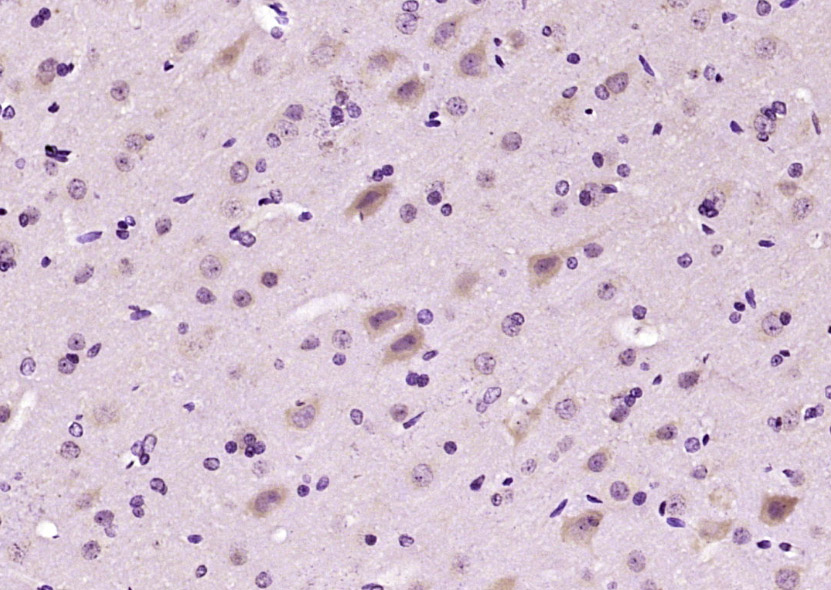
Rabbit Anti-NR3C2/Mineralocorticoid receptor antibody
Aldosterone receptor; MCR; MGC133092; MLR; MR; NR3 C2; NR3C2; NR3C2 protein; Nuclear receptor subfamily 3 group C member 2; MCR_HUMAN.
View History [Clear]
Details
Product Name NR3C2/Mineralocorticoid receptor Chinese Name 盐皮质激素受体抗体 Alias Aldosterone receptor; MCR; MGC133092; MLR; MR; NR3 C2; NR3C2; NR3C2 protein; Nuclear receptor subfamily 3 group C member 2; MCR_HUMAN. Research Area Cell biology immunology transcriptional regulatory factor Immunogen Species Rabbit Clonality Polyclonal React Species Rat, (predicted: Human, Mouse, Chicken, Dog, Horse, Rabbit, ) Applications WB=1:500-2000 ELISA=1:5000-10000 IHC-P=1:100-500 IHC-F=1:100-500 ICC=1:100-500 IF=1:100-500 (Paraffin sections need antigen repair)
not yet tested in other applications.
optimal dilutions/concentrations should be determined by the end user.Theoretical molecular weight 107kDa Cellular localization The nucleus cytoplasmic The cell membrane Form Liquid Concentration 1mg/ml immunogen KLH conjugated synthetic peptide derived from human NR3C2/Mineralocorticoid receptor: 891-984/984 Lsotype IgG Purification affinity purified by Protein A Buffer Solution 0.01M TBS(pH7.4) with 1% BSA, 0.03% Proclin300 and 50% Glycerol. Storage Shipped at 4℃. Store at -20 °C for one year. Avoid repeated freeze/thaw cycles. Attention This product as supplied is intended for research use only, not for use in human, therapeutic or diagnostic applications. PubMed PubMed Product Detail Steroid receptors are ligand dependent, intracellular proteins that stimulate transcription of specific genes by binding to specific DNA sequences following activation by the appropriate hormone. Mineralocorticoids are a family of steroids, secreted by the adrenal cortex, necessary for the regulation of a number of metabolic processes including electrolyte regulation. These compounds exert their effect through their interaction with the mineralocorticoid receptor and that complex's subsequent association with DNA. Given the function of mineralocorticoids, it is not surprising to find that the kidney is a primary target organ for mineralocorticoids and that this organ has been shown to contain Mineralocorticoid Receptor.
Function:
Receptor for both mineralocorticoids (MC) such as aldosterone and glucocorticoids (GC) such as corticosterone or cortisol. Binds to mineralocorticoid response elements (MRE) and transactivates target genes. The effect of MC is to increase ion and water transport and thus raise extracellular fluid volume and blood pressure and lower potassium levels.
Subunit:
Heteromultimeric cytoplasmic complex with HSP90, HSP70, and FKBP4, in the absence of ligand. After ligand binding, it translocates to the nucleus and binds to DNA as a homodimer and as a heterodimer with NR3C1. May interact with HSD11B2 in the absence of ligand. Binds the coactivators NCOA1, NCOA2, TIF1 and NRIP1.
Subcellular Location:
Cytoplasm. Nucleus. Endoplasmic reticulum membrane; Peripheral membrane protein. Note=Cytoplasmic and nuclear in the absence of ligand; nuclear after ligand-binding. When bound to HSD11B2, it is found associated with the endoplasmic reticulum membrane.
Tissue Specificity:
Ubiquitous. Highly expressed in distal tubules, convoluted tubules and cortical collecting duct in kidney, and in sweat glands. Detected at lower levels in cardiomyocytes, in epidermis and in colon enterocytes.
Post-translational modifications:
Phosphorylated.
DISEASE:
Defects in NR3C2 are a cause of autosomal dominant pseudohypoaldosteronism type I (AD-PHA1) [MIM:177735]. PHA1 is characterized by urinary salt wasting, resulting from target organ unresponsiveness to mineralocorticoids. There are 2 forms of PHA1: the autosomal dominant form that is mild, and the recessive form which is more severe and due to defects in any of the epithelial sodium channel subunits. In AD-PHA1 the target organ defect is confined to kidney. Clinical expression can vary from asymptomatic to moderate. It may be severe at birth, but symptoms remit with age. Familial and sporadic cases have been reported.
Defects in NR3C2 are a cause of early-onset hypertension with severe exacerbation in pregnancy (EOHSEP) [MIM:605115]. Inheritance is autosomal dominant. The disease is characterized by the onset of severe hypertension before the age of 20, and by suppression of aldosterone secretion.
Similarity:
Belongs to the nuclear hormone receptor family. NR3 subfamily. Contains 1 nuclear receptor DNA-binding domain.
SWISS:
P08235
Gene ID:
4306
Database links:Entrez Gene: 4306 Human
Entrez Gene: 110784 Mouse
Omim: 600983 Human
SwissProt: P08235 Human
SwissProt: Q8VII8 Mouse
Unigene: 163924 Human
Unigene: 723668 Human
Unigene: 324393 Mouse
Unigene: 9678 Rat
Mineralocorticoid receptor属于类固醇/甲状腺/维生素A配体依赖的转录因子受体超家族,是调节机体水盐代谢的重要甾体激素,有重要的生理、病理功能。Product Picture
References (0)
No References
Bought notes(bought amounts latest0)
No one bought this product
User Comment(Total0User Comment Num)
- No comment



 +86 571 56623320
+86 571 56623320
 +86 18668110335
+86 18668110335

